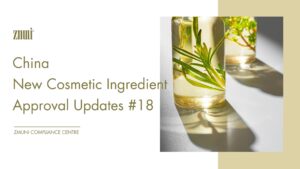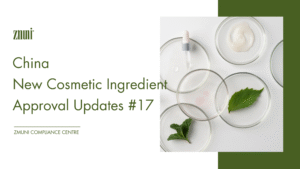+86 571 8659 2517
+86 180 5841 8258
info@zmuni.com

From September 1 to 10, 2025, 3 new cosmetic ingredients were notified with the China National Medical Products Administration (NMPA). The technical requirements for the 3 new cosmetic ingredients mentioned above have not been disclosed, and they have not yet entered the safety monitoring period. Camellia Chekiangoleosa Notification 20250107 was submitted by Forest Cabin, one of the first skincare brands in China to highlight Camellia chekiangoleosa (red camellia) as a key skincare ingredient. Earlier in May, the brand had submitted Notification 20250049 for Camellia chekiangoleosa Seed Oil. The newly notified ingredient is the fermented derivative of the previous one. Coreopsis

On September 5, 2025, China's National Institutes for Food and Drug Control (NIFDC) issued a public consultation notice on two draft technical guidelines concerning the research and quality control of anti-hair loss cosmetics. These guidelines aim to provide clearer technical direction for product development, safety assessment, and quality standards for high-risk cosmetic categories—commonly referred to as special cosmetics under China's regulatory framework. The consultation is open for public feedback until September 20, 2025. Comments can be submitted via email to hzppjzx@nifdc.org.cn Drafts for Consultation: Technical Guidelines for Anti-Hair Loss Products (Trial)(Draft for Comments) Technical Guidelines for Research on Efficacy-Related Ingredients in Anti-Hair

This article provides a comprehensive overview of key regulatory developments in the food sector in August 2025, both in China and internationally. It focuses on updates related to new food ingredients, food additives, health foods, and feed, aiming to offer timely and in-depth regulatory alerts for enterprises engaged in food import and export. China Food Regulatory Updates 🔘 China Updates on Three New Foods in August 2025 In August 2025, there were 2 new submissions for new food ingredients, 1 was notified with review comments, and 19 received extension notices. For new varieties of food additives, 9 submissions were accepted, 6 were

The global cosmetics regulatory environment continues to evolve. To help businesses stay updated with regulatory changes, ZMUni Compliance Center regularly releases a monthly recap of global cosmetics regulations. This article covers the regulatory developments related to cosmetics in China and globally in August 2025, with an emphasis on updates in cosmetic ingredients and cosmetic management, among other areas. China Cosmetic Regulatory Updates New Cosmetics Ingredients (NCI) Notification In August 2025, 14 new cosmetic ingredients were notified with the China National Medical Products Administration (NMPA). They include: Before this recap, ZMUni has continued to release passages introducing the NCI updates, along

On August 29, 2025, China's National Medical Products Administration (NMPA) announced the inclusion of five newly approved toxicological test methods into the the Safety and Technical Standards for Cosmetics (2015 Edition). The five newly introduced methods are: No. Testing Method Remarks 1 Bovine Corneal Opacity and Permeability (BCOP) Assay These tow methods reflect China NMPA's more open attitude toward animal testing and support non-animal testing strategies. 2 In Chemico Skin Sensitisation: Kinetic Direct Peptide Reactivity Assay (kDPRA) 3 Skin Absorption: In vitro Method These two provide additional safety evaluation options for new cosmetic ingredient application and comprehensive cosmetic product safety

On August 25, 2025, China's General Administration of Customs (GACC) released its list of non-compliant imported food products for July 2025. According to the list, a total of 476 batches from 37 countries and regions were denied entry, representing a month-on-month decrease of approximately 2% (down 9 batches from 485 in June) but a year-on-year increase of about 21% up 84 batches from 392 in July 2024). The number of food items denied entry remained at a relatively high level. The majority of non-compliant products originated from the U.S. (19.9%), followed by Spain (17.6%), Japan (16.0%), and Vietnam (8.4%). Key reasons for import

From August 14 to August 27, 2025, 7 new cosmetic ingredients were notified with the China National Medical Products Administration (NMPA). The technical requirements for the 7 new cosmetic ingredients mentioned above have not been disclosed, and they have not yet entered the safety monitoring period. Fermented lysates Notification 20250100 was submitted by GALENIC COSMETICS LABORATORY SAS (France) for a fermented lysate derived from Bifidobacterium longum subsp. Infantis, a widely used probiotic. In May, 2025, this company also notified another ingredient sourced from the same probiotic (Notification No. 20250050). Botanicals Notification No.20250101: Annona Squamosa Fruit Extract Notification

A recent review of the China State Administration for Market Regulation's website shows that five imported health foods were approved for registration between May and July—the first such registrations since 2017. Four were registered by WRIGHT LIFE PHARMACEUTICAL LIMITED, and one by Indonesia's PT. HELMIGS PRIMA SEJAHTERA. Basic Information of the Five Approved Imported Health Foods Approval No. Product Name Function Main Ingredients Guo Shi Jian Zhu J20250001 (“国食健注J20250001”) WRIGHT LIFE NOTOGINSENG AND PANAX QUINQUEFOLIUS CAPSULES Supports immune health Notoginseng Radix et Rhizoma, Panacis quinquefolii radix Guo Shi Jian Zhu J20250002 (“国食健注J20250002”) HELMIG'S CURCUMIN TABLET Supports healthy blood pressure; provides auxiliary
+86 571 8659 2517
+86 180 5841 8258
info@zmuni.com